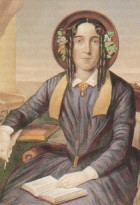|
● Early
Fiction
● Transcendentalists
● Power
of Imagination
● New
Visions of America
● Reform
and Liberation
● Regionalism
● A
New Wave
● Sympathetic
Views
● Rebellious Spirit
● The
Modernists
● The Lost Generation
● Harlem Renaissance
● New
Drama
● Depression,
Realism and Escapism
● Postwar Voices
and the "Beat Generation"
● New American
Voices
Reform and Liberation
 New
England intellectuals had, in fact, a tradition of involvement in
liberal reform. In the 1850s, this took the form of a movement to
end the institution of slavery, which by that time was practiced
chiefly in the southern states. In 1852, a New England woman named New
England intellectuals had, in fact, a tradition of involvement in
liberal reform. In the 1850s, this took the form of a movement to
end the institution of slavery, which by that time was practiced
chiefly in the southern states. In 1852, a New England woman named
 |
|
Harriet Beecher
Stowe
|
Harriet Beecher Stowe (1811-1896) wrote
Uncle Tom's Cabin, an antislavery novel that galvanized
political opinion across the nation. Sentimental
and melodramatic as it was, Uncle Tom's Cabin portrayed black slaves
as sympathetic, suffering figures, and created an image of the cruel
slaveowner in the character of Simon Legree. Largely
as a result of this best-selling novel, the slavery question became
a passionately debated political issue. Eventually the Southern
states determined to secede
from the Union and to establish themselves as an independent country
in order to preserve their way of life, which included an agrarian
economy based in great part on slave labor. The result of Northern
reaction to this secession
was the Civil War (1861-1865), fought to preserve the Union. One
consequence of the South's defeat in that war was the abolition
of slavery in the United States.
Previous Page Next
Page
|

